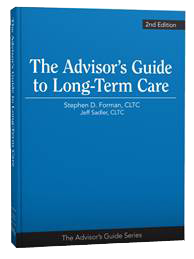Public Programs
Medicare
Because the misinformation surrounding Medicare had become so pervasive and entrenched, in 2008 thirty members of Congress signed a petition demanding that our annual Social Security Statements be amended to include the following warning: "Medicare does not pay for long term care, so you may want to consider options for private insurance."
Medicare does not pay for personal or custodial care (help with Activities of Daily Living), which are the lion's share of LTC services. On the other hand, Medicare may pay for hospice, home health, and a limited stay in a skilled nursing facility-- but only if you meet certain criteria.
Medicare will pay for care in a skilled nursing facility when:
- You have had a prior inpatient hospital stay of at least three days, and
- You are admitted to a Medicare-certified nursing facility within 30 days of your prior hospital stay, and
- You need either skilled care or skilled rehabilitative care (such as intravenous injections which can only be given by a licensed nurse)
If all these conditions are met, Medicare will reimburse a portion of your costs:
- For the first 20 days, Medicare pays 100% of your skilled nursing facility costs.
- For days 21 - 100, you pay the first $204/day (as of 2024), and Medicare pays the balance, if any.
- For days 101+, Medicare pays nothing.
Should you qualify for Medicare's home health care benefit, your costs are typically $0 (plus a 20% coinsurance for durable medical equipment). Unfortunately, the limitations are strict: personal and homemaker services are not covered. Payments are generally only available for part-time or intermittent skilled nursing care, or physical therapy, occupational therapy, or speech-language pathology. Furthermore, such care must be ordered by your physician, provided by a Medicare-certified agency, and received while you are "homebound", which means leaving home is a major effort.
These are just the highlights. To learn more, please download your free consumer handbook Medicare & You 2023 from the sidebar on the right side of this page.
Medicaid
Medicaid is a health and social services program funded and administered jointly by the states and federal government. Whereas Medicare is considered an entitlement (the taxes you've paid earn you the right to its benefits), Medicaid is a means-tested, needs-based program whose LTC benefits must be repaid.
To qualify for long term care benefits under Medicaid, you must meet tests related to both financial need and functional need.
- All of your income except for a small personal allowance (and a few other exceptions) must be contributed to the cost of your care
- Your assets will be divided into those considered "exempt" and those which are "countable". Although you are allowed to keep an unlimited amount of exempt assets, the process of spending countable assets on your care until reaching the maximum Medicaid allows you to keep (typically $2,000) is called spenddown.
- The rules regarding spousal income and asset allowance are complex and beyond the scope of this article.
Medicaid's functional criteria may differ from those we find in private LTC insurance-- for instance, some states require a 3 of 6 ADL trigger (now banned in the qualified market). And some desired settings-- such as assisted living-- are not covered at all.
The program has been stretched to overcapacity-- a situation which has led to chronic accusations of poor quality (facilities are reimbursed over $20 per day less than the cost of care) and lack of access (with waiting lists for home care numbering in the hundreds of thousands).
In an effort to stem the tide of middle-class and affluent families artificially impoverishing themselves to qualify for Medicaid, Congress took a number of legislative steps to tighten eligibility, the most recent being the Deficit Reduction Act of 2005 (DRA). Among the law's restrictions are a cap on the amount of home equity which may be exempted, a tougher penalty for improper asset transfers, and new rules for so-called "Medicaid-compliant annuities".
To learn how Medicaid works in your state, visit the State Medicaid Policies section of the federal government's Medicaid website [offsite].
This is a Deep Dive topic.
Click here to visit a companion page containing additional in-depth information.
Veterans Benefits
Beginning in 1996 Congress created uniform rules concerning eligibility and healthcare benefits for veterans, and began by classifying them into 8 Priority Groups (some with Sub-priority Groups). These range from Group 1 (veterans with service-connected disabilities rated 50% or more disabling or veterans determined by the VA to be unemployable due to service-connected conditions) all the way to Group 8 (veterans whose income and/or net worth is above the means-test threshold, but who agree to pay a specified co-payment). In any event, there is no direct coverage for custodial care through these Groups.
Rather, custodial care at home is provided under the Domiciliary Care Program, funded by the Aid & Attendance Pension. This benefit is not based on service-connected disabilities, but rather on those who pass strict service, income and asset criteria. Generally speaking, if a veteran can meet the income and asset thresholds of the A&A benefit, he or she would not be a suitable candidate for LTC insurance.
The VA does cover nursing facilities on an automatic basis for service-connected conditions or veterans with disabilities rated 70% or greater. (Eligibility for other veterans is limited to resource and space-availability.)
Ultimately, the Office of Personnel Management (OPM) summed up the situation this way, "Most health insurance programs, including the Federal Employee Health Benefit (FEHB) program, TriCare and TriCare for Life provide little or no coverage for long-term care. This is why the US Office of Personnel Management sponsors a long-term care insurance program for members of the federal family. Long-term care insurance can be a smart way to protect your assets and remain financially independent, should you need extended care services."
For more information about VA benefits please see "VA Long Term Care Services" [offsite] from the U.S. Department of Veterans Affairs.





